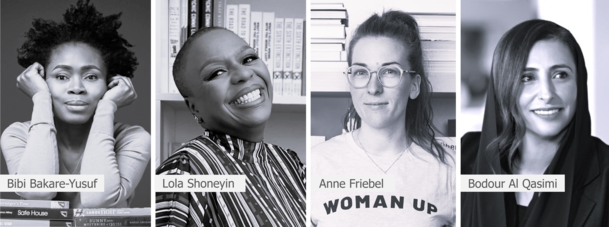The publishing industry is one where gender is balanced, often in favour of women. But women in the most senior leadership positions are few and far between, at least in many parts of the world, and certainly in the bigger multinational publishing houses where men hold the most senior leadership positions. It’s an important subject to explore and to understand how we can effect change, at national levels, at an international level, as individuals, and as an industry.
Certainly, the benefits of having women in senior leadership or even decision-making positions are manifold. Women bring diverse perspectives and drive innovation. This can lead to a richer, more varied range of content which will resonate with a broader audience, drive creativity by introducing different approaches to problem-solving and decision-making, and help address gender biases, promote fair treatment, and create policies that support work-life balance. Furthermore, having women in leadership roles can improve company reputation and attract a diverse talent pool, which is crucial for long-term success.
Despite the intrinsic benefits of diverse leadership, many women are leaving corporate environments to establish their own ventures. This trend is driven by systemic issues such as a lack of supportive culture, limited opportunities for advancement, and persistent gender biases that hinder their growth and satisfaction within traditional corporate structures. Additionally, women often face challenges in balancing professional and personal responsibilities, prompting them to seek more flexible and supportive environments.

Women are also starting to flourish by becoming publishing entrepreneurs in African countries, creating a new style of publishing away from the textbook-dominated, male-dominated traditional industries. In Nigeria, for instance, publishing entrepreneurs like Bibi Bakare-Yusuf of Cassava Republic Press and Lola Shoneyin of Ouida Books are revolutionizing the industry with innovative and diverse content. These entrepreneurs are not only transforming the local publishing landscapes but also providing platforms for underrepresented voices.
Globally, efforts are being made to shift the balance. At a company level, more companies are implementing policies that support a better work-life balance and provide flexibility, as well as providing opportunities for career advancement. We are also seeing more mentoring schemes being set up, at a company and an industry level. Crucially, conversations about these issues are happening more frequently, both privately and publicly. Additionally, companies are increasingly recognizing the importance of diversity training and unconscious bias workshops to create more inclusive environments.
More networks are being established. In the UK, we have the FLIP (Female Leadership in Publishing), which recently conducted a survey revealing that many women are facing imposter syndrome, working while having caring responsibilities, work-life balance issues, mental health challenges, burnout, a lack of suitable line-management and company support, and the ability for women to own their own boundaries in the workplace. In Germany, The Female Publisher was established with the objectives of making women in the publishing industry visible and connecting them with each other. The founders also stated that ‘We want to share knowledge and empower each other. We want to stand up for more equality in the publishing industry and promote an exchange on equal terms. We want to launch joint campaigns and collaborations that can have more impact than the measures taken by individual publishers’. The co-founder, Anne Friebel of Palomaa Publishing in Germany, was an inaugural winner of the PublisHer excellence awards, presented at the Bologna Book Fair. Other networks are also alive and kicking in countries such as Brazil and India, which have also played host to various PublisHer events bringing together women in publishing for networking and discussions.
Kudos should be given to Bodour Al Qasimi, Founder of PublisHer , who has contributed significantly to this movement. Bodour decided to establish PublisHer in the run-up to her presidency of the International Publishers Association. This was a milestone, having been only the second-ever president of this global organization in our industry. Recognizing the lack of gender equality in leadership roles, especially in the Arab world, Bodour set up the network, speaking to hundreds of women around the world to better understand what could be put in place to help change the story. A mentorship scheme was established, and a toolkit launched to help women everywhere take action. The initiative now has an advisory board, stands at book fairs around the world, supports women who want to host events themselves (and have done so in Seoul, Delhi, Rio de Janeiro, Kuala Lumpur, Thessaloniki, and many more), and we saw the first set of awards launch earlier this year.
The result of these networks is that conversations are happening, women are feeling seen and valued, and are feeling empowered. The landscape is slowly changing. The UK Publishers Association survey, which revealed an increasing proportion of women in executive leadership (56%) and senior management (60%)[1], highlights a positive trend but also underscores the need for similar studies globally to track progress. Any shift is welcome; we want to see more women in leadership positions who can serve as role models and mentors for other women in the industry.
To truly turn the tide, it is imperative for all stakeholders in the publishing industry to support and participate in these networks and initiatives. By doing so, we can ensure a more inclusive and innovative future for publishing, inspiring the next generation of female leaders and creating a pipeline of talented individuals motivated to pursue leadership roles.
Emma House
Emma House is an international publishing consultant. She started her book publishing career at the London Book Fair and at the UK Publishers Association. She is a former advisory board member of PublisHer and regularly interviews senior women in publishing for the PublisHer website.
[1] https://www.publishers.org.uk/publications/the-uk-publishing-workforce-diversity-inclusion-and-belonging-in-2022/

















